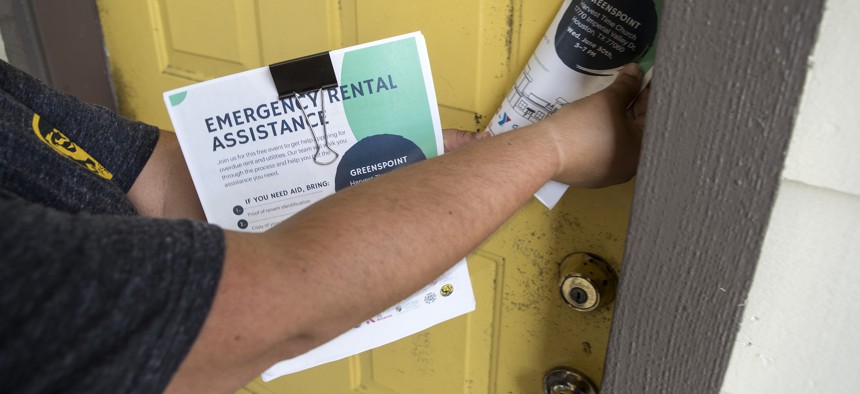Funding for Rental Assistance is Ending, But Need Continues

Jennifer Hernandez passes out fliers at an apartment complex in the Greenspoint area alerting residents about the Houston-Harris County Emergency Rental Assistance Program in 2021. Brett Coomer/Houston Chronicle via Getty Images
Some states are working to develop programs that will pick up where pandemic-era programs are leaving off.
Funding from the federal emergency rental assistance that saved millions of households from eviction during the pandemic is nearly dried up. Now, some states want to build their own rental assistance programs. A new series of case studies on best practices could help them do so.
In 2021, the National Low Income Housing Coalition (NLIHC) launched the End Rental Arrears to Stop Eviction (ERASE) project to help ensure that nearly $47 million in federal emergency rental assistance was directed to households that needed it most. There were a number of barriers that made it difficult for some people to access emergency rental assistance, such as language comprehension, a lack of access to the internet or simply no awareness of the program, according to Sarah Gallagher, senior director of the project.
The coalition worked with 38 state and local nonprofits to raise awareness of the availability of rental assistance and to share important information with low-income renters and renters of color. In the end, the federally-funded rental assistance program was largely a success. Approximately two-thirds of renters who received assistance had very low incomes, more than 40% were Black and about 20% were Latino, according to NLIHC.
With the last of the federal rental assistance having been distributed, some states are looking to continue supporting vulnerable renters.
“Even though this was an unprecedented amount of funding, there's still a need,” Gallagher said. “The crisis isn't over.”
In March, Minnesota passed a law that will provide $50 million for a state emergency rental assistance program. King County, Washington—where Seattle is located—is aiming to soon launch its own state-funded rental assistance program. And in Maryland, lawmakers allocated $2 million for a similar initiative, though the sum fell far short of the $175 million advocates were hoping to secure. More than a dozen other states are considering legislation that would sustain emergency rental assistance programs, Gallagher said.
NLIHC published five case studies last week that look at how organizations in Connecticut, Idaho, Indiana, Mississippi and the city of Detroit mobilized to help direct emergency rental assistance to those who needed it most. As states and cities consider starting their own emergency rental programs, the pandemic-era efforts can provide some insight into what’s important to such a program.
The Connecticut Fair Housing Center, for instance, found that more eviction data was needed to ensure the funds would be directed to households that most needed them.
That’s a challenge nationwide, Gallagher said. Court systems often have different ways of collecting eviction data and there’s little standardization, but that information is critical for taking a targeted approach.
“That is a need across the country,” she said, “to develop a centralized and systematic way of collecting eviction data so that it can be used to learn more and support eviction prevention and diversion activities.”
The Connecticut Fair Housing Center created a database to track which renters were able to access emergency rental assistance. That information helped inform where to direct resources to provide additional help.
ERASE also revealed just how important it is for governments to work closely with community-based organizations, judicial systems, tenants and landlords to ensure resources are going to residents who need them most, Gallagher said.
Take Detroit, for example. At first, program administrators for the Detroit Rental Assistance Program mostly relied on digital messaging to spread word of emergency rental assistance. But only 40% of Detroiters had access to the internet, rendering those efforts largely ineffective.
To better spread awareness of the assistance available, the United Community Housing Coalition—which was the contractor administering the funds—created Keep Detroiters in Their Homes, a project that brought together three BIPOC-led community-based organizations and a legal aid nonprofit. These groups used on-the-ground techniques, including door-knocking, canvassing, sending out mailers and phone banking, to spread assistance awareness. Keep Detroiters in Their Homes also set the stage for creating the e Detroit Right to Counsel Coalition, which aims to help renters avoid eviction.
“This holistic approach is really something that we want to make sure folks understand,” Gallagher said.
Molly Bolan is the assistant editor for Route Fifty.

NEXT STORY: 7% of the United States Is a ‘Play Desert’






